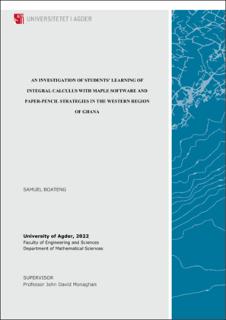| dc.description.abstract | The goal of the research was to look into the impact of Maple software instruction on senior high school students' understanding of integral calculus. The study adopted a mixed-method design comprising qualitative and quantitative research designs. The researcher used both purposive and simple random sampling techniques to select one hundred (100) participants: fifty (50) participants for the control group and fifty (50) participants for the experimental group. The data collection instruments used in the study were an interview, pre-test and post-test. Data analysis was carried out using descriptive statistics and an Independent Samples t-test. The study found that 7(7%) participants found it difficult to execute correct substitution of the lower and upper limits of definite integral questions. Moreover, most of the participants, 35(35%), omitted the constant of integration after responding to the indefinite integral test item of the pre-test. It was noted that 18(18%) of the participants could not correctly integrate the polynomial or quadratic function administered to them. The independent samples t-test analysis of the post-test scores for the experimental and control groups revealed a statistically significant difference between the experimental group (M = 24.80; SD = 9.48) and the control group (M = 20.65; SD = 7.67). The estimated t-statistic was (t = 2.986; p = 0.005). This shows that Maple Software's experimental group outperformed the control group using the paper and pencil strategy. The analysis of the interview data indicated that Maple Software has contributed to the success of students’ achievement in the integral calculus by arousing and sustaining the student’s interest. The Maple Software also made it easier for students to follow the calculus instruction. The findings recommended that technology and mathematical software should be used in the teaching and learning of integration at schools. | |
